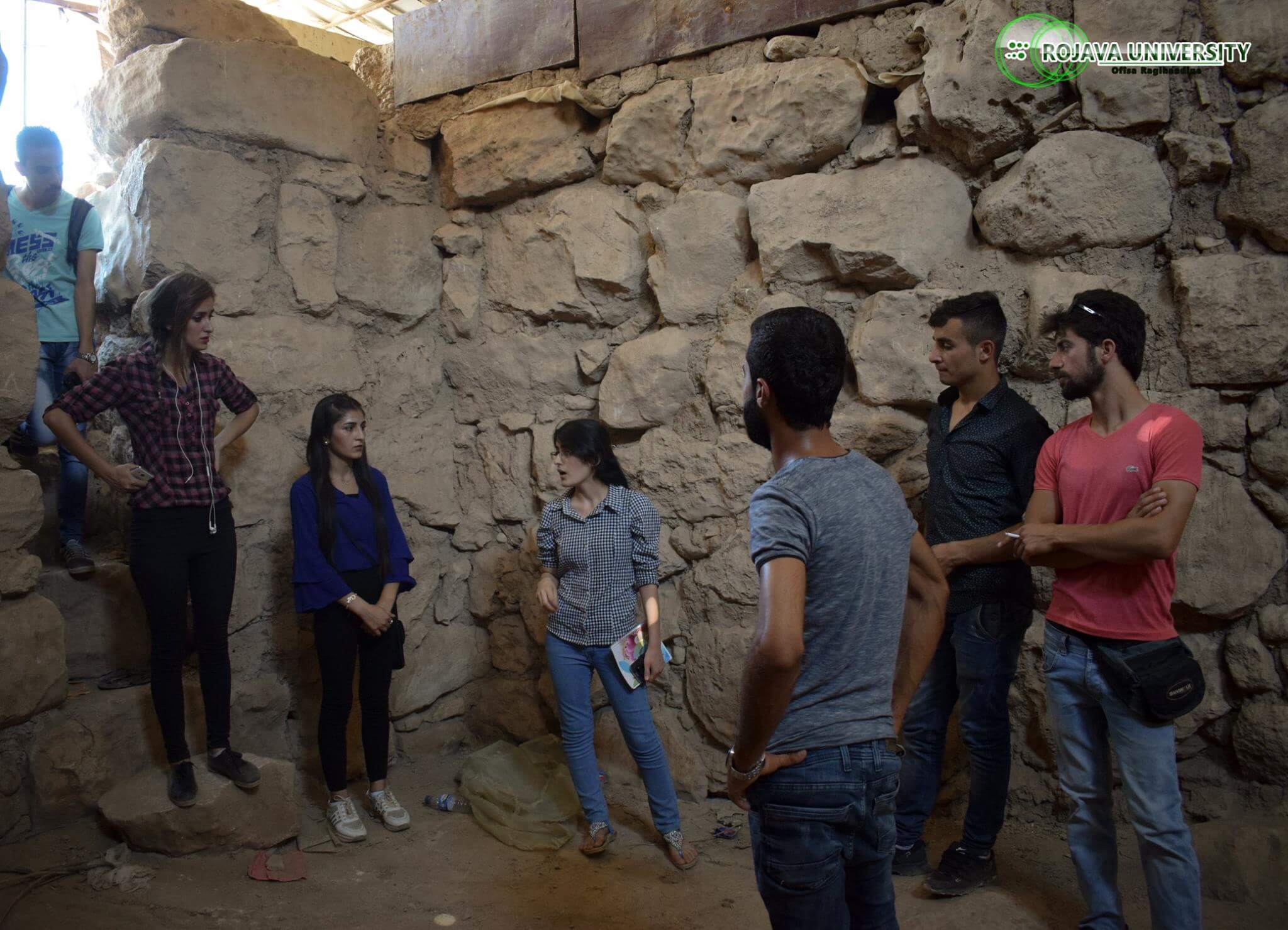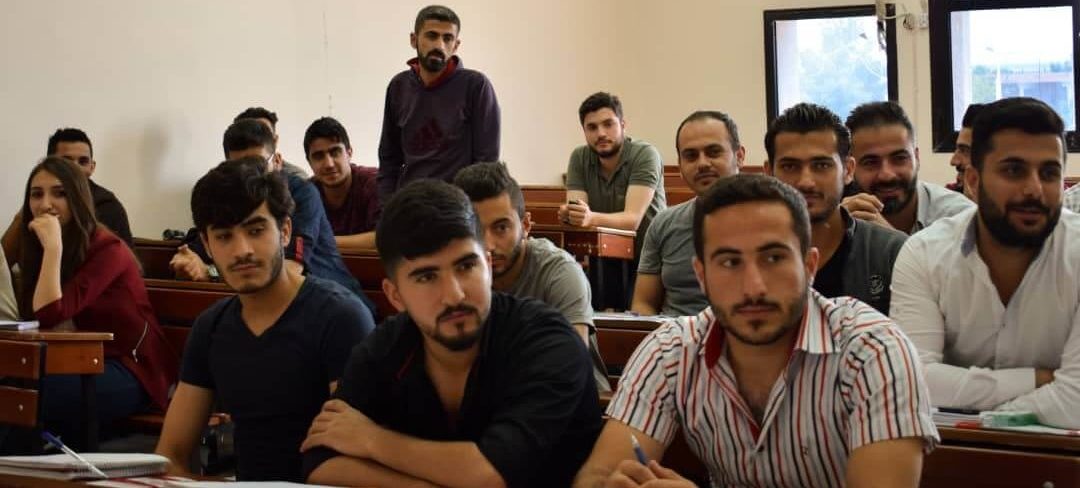Having beat formidable odds, a university that was started by the Kurdish-led local administration in the northeastern region of Syria will begin its third academic year this fall.
Rojava University is part of a larger project to build recognized institutions in an area that aspires to political independence. Advocates for the university say it meets a need for higher education in a remote region of Syria that had been only meagerly served in the past. The institution’s detractors say it is a flawed, unaccredited institution that is contributing to the potential post-war splintering of Syria.
Rojava (which means “in the west”) is the Kurdish name for the Democratic Federation of Northern Syria, a fledgling Kurdish-led administration established in the part of the country that the forces of the mainly Kurdish YPG won from central government control in the country’s civil war. Some analysts believe that Rojava will achieve an autonomy agreement with Damascus in a postwar settlement.
The federation has attracted ardent support outside the area for its socially progressive ideology. Student groups supporting Rojava have grown prolifically on campuses in Europe and the United States, and numerous foreign academics, authors and journalists have visited the Rojava University campus since its founding in 2016 and spoken enthusiastically about the Rojava project.
“Young people in that region were historically excluded from higher education by the regime,” said Rana Khalaf, author of a paper on Rojava’s institutions. “If they wanted to study, they had to go to Aleppo. This meant that girls could not study, because their families would not allow them to commute between the two places.”
At the end of its second year, Rojava University had 720 students and 127 faculty members, according to Massoud Mohammed, a media spokesman for the university.
The university has academic departments in petroleum, petrochemical and agricultural engineering, Kurdish literature, fine arts, education and women’s studies. Its main campus is in Qamishli, a city on the border with Turkey. Subjects related to petroleum are taught at a facility in Rumeilan, 40 miles farther east in the region’s oil-producing area.

The university does not charge tuition and its entire budget is met by the Rojava region’s administration, although the university hopes to establish its own funding, Mohammed said. The Rojava administration’s revenues come from oil, agriculture and charges for services.
According to Mohammed, the university compresses the content of a four-year undergraduate program into two years. Nothing important is left out, he said, and the summer vacation is only 10 days long.
“We have an urgent need for qualified people to work in the regional administration,” he said. Mohammed himself teaches computer engineering, in addition to being a member of the university’s media office and a member of the Rojava federation’s committee on external relations.
Assessments differ about the quality of education Rojava University provides. While it has been commended for a progressive approach to education, based on the ideas of John Dewey and Paulo Freire, few of the teaching faculty have doctorates, Khalaf said. “The teaching does not even reach the standards of Arab universities, let alone international standards,” she said.
“There is a little bit of propaganda there,” Khalaf said. “But there are some sincere things happening, especially in women’s studies. There are some really good people working there, and they wholeheartedly believe in the cause.”
Rojava University received considerable international attention in October 2017 when it inaugurated its women’s studies program and called this field of study “jineology.” The term, a coinage mixing Kurdish and Greek elements, reflects the essential role of feminism in the ideology of Rojava. About 20 students were enrolled in this department in the academic year that recently concluded, Mohammed said.
Students are admitted to Rojava University on the basis of the existing Syrian system of selection, known as mufaddalah. In this system—widely used throughout the Arab region—students entering universities are allowed to choose their field of study on the basis of the score they achieve on their high school exit examinations (al-thanawiyya al-‘aama). Exam results are given as a single percentage. Students with scores over 90 percent are admitted to study for degrees in scientific or professional subjects such as medicine, dentistry, engineering or law; those achieving a lower score are admitted to study humanities subjects such as literature.
Accordingly, Rojava University will award diplomas in either science or literature. It hopes to graduate its first cohort of about 200 students in the next few weeks, Mohammed said. The exact number will depend on students fulfilling course requirements.
There is no certainty that degrees issued by Rojava University will be recognized by institutions inside or outside Syria, particularly the Ministry of Education, in Damascus. The university has also not yet received formal recognition from international accrediting organizations.
“This is one point that is always before us,” Mohammed said, speaking of the risk involved in issuing diplomas at a time of conflict and political uncertainty.
Mohammed points out that the original purpose of Rojava University was to provide higher education to people who had formerly not had access to it. “Our needs were internal,” he said. “We were meeting the needs of our society. There was a great need to educate people.”
Rojava University enters its third year with what analysts see as the tacit permission of the Damascus government.
“The security situation is good here,” Mohammed said. “There are no real problems.”
Soldiers of Syrian government control access to Qamishli’s airport, and maintain a security corridor that extends through the city center from the airport to the Turkish border. But those troops are a small, symbolic presence in a region in firm Kurdish control. The security corridor is porous enough to allow residents to pass through it without difficulty, Mohammed said.
“If they didn’t want Rojava University to exist,” Rana Khalaf said, “they would have shelled it by now.”
Tarek Abd El-Galil contributed reporting to this article.

